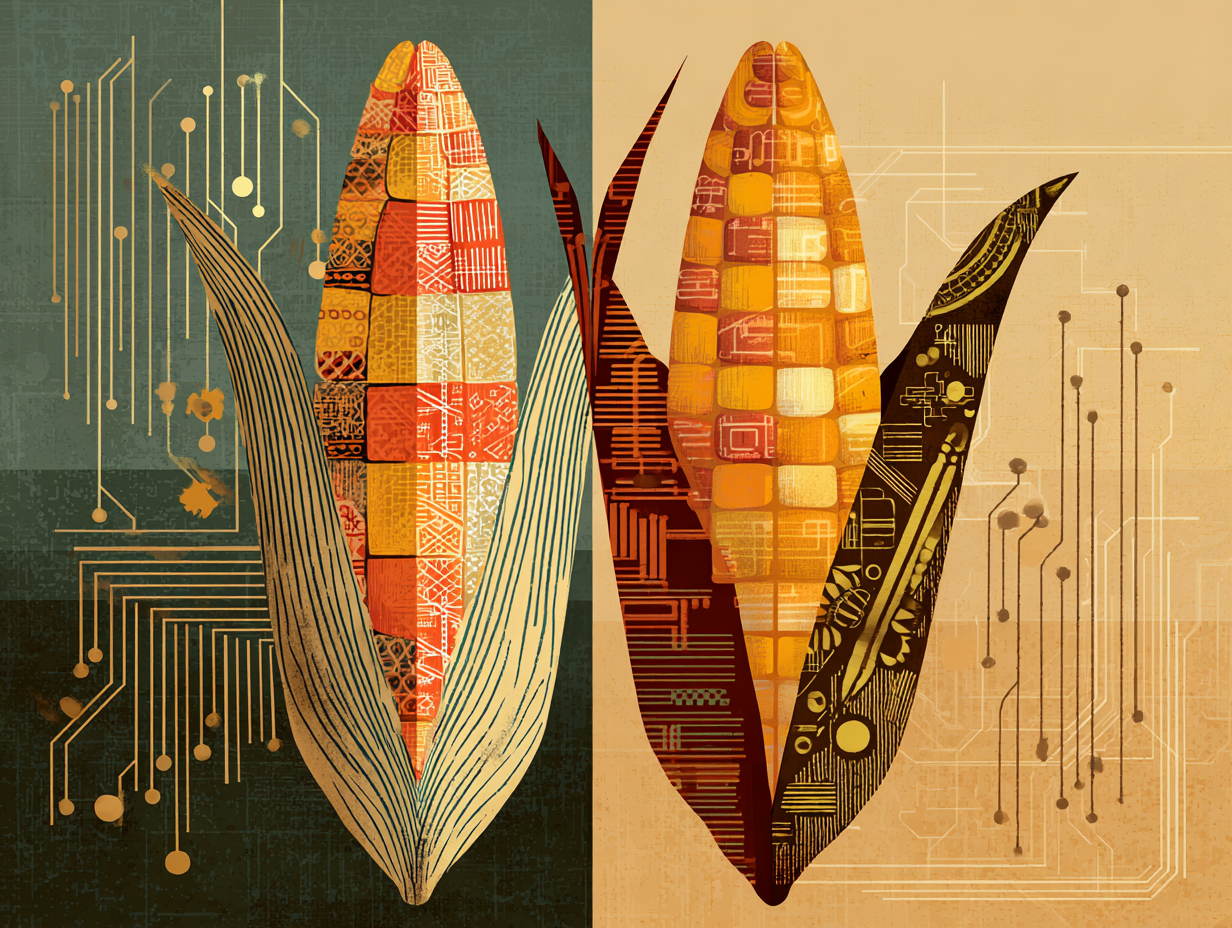
Genetically modified organisms (GMOs) are those whose DNA has been altered, either by using their own genetic material or by incorporating DNA fragments from other species. In particular, transgenic organisms are created using recombinant technology, which involves the deliberate introduction of genes from a different species. This means that, although all transgenic organisms are GMOs, not all GMOs are transgenic, since a genetic modification within the same species does not classify them as such. (National Commission on Human Rights, 2024).
In agriculture, GMOs include crops to which specific genes have been added to improve their yield, making them more resistant to pests, diseases or adverse environmental conditions (National Human Rights Commission, 2024).
The recent decision of the Mexican Congress to prohibit the cultivation of transgenic corn in the country (Ramos, R., 2025) marks a milestone in national agricultural and food policy. With the modification of Articles 4 and 27 of the Political Constitution of the United Mexican States, the aim is to protect biodiversity, food sovereignty and traditional knowledge (Ramos, R., 2025). However, the issue is not simple. Behind this decision lies a dichotomy: the preservation of native corn and the food security of a growing population that depends on imports.
The debate on transgenic corn is not new and has generated controversy in various sectors, from the scientific to the economic and political. While there are positions that defend its use as a solution to guarantee food security and improve rural productivity, there are also concerns about its effects on biodiversity, public health and the rural economy. In this context, the decision to ban its cultivation in Mexico represents a drastic measure that could have long-term repercussions.
Native maize: a cultural treasure insufficient to feed everyone
Maize is more than a crop in Mexico; it is a symbol of national identity (Damián, F., 2025). The preservation of native varieties is fundamental for the biological and cultural diversity of the country. For centuries, indigenous and peasant communities have cultivated different varieties adapted to the climatic and geographic conditions of each region, preserving an invaluable genetic heritage. However, the problem lies in the insufficiency of national production to supply the growing demand of the population.
While white corn production satisfies domestic consumption, yellow corn, essential for the livestock industry and other sectors, is in deficit. The gap is evident: Mexico produces only 2.6 million tons of yellow corn annually, but consumes about 14 million tons, which forces it to import about 20 million tons of corn in total, mostly transgenic from the United States of America (Comisión Nacional de los Derechos Humanos, 2024). This deficit poses a paradox: while the country strives to protect its agricultural diversity, it also depends on genetically modified products from abroad.
Science and politics: an unfinished debate
The main argument behind the ban on GM maize is the protection of biodiversity and public health. However, the scientific evidence regarding its risks is controversial. While some studies suggest a possible link with adverse health effects, such as allergies and metabolic diseases, others argue that there is no conclusive consensus on its dangers.
PAN deputy, Agustín Rodríguez, argued that this reform limits the country in the event of an international corn shortage contingency. He pointed out that transgenic corn has been consumed for almost 30 years and that there is no scientific evidence showing that transgenic corn causes harm to humans or animals (Damián, F., 2025).
In addition, technologies such as genetic modification have enabled the development of varieties that are more resistant to pests and drought, reducing the need for pesticides and increasing yields.
The use of the herbicide glyphosate in the cultivation of GM corn is one of the key concerns. In 2015, the World Health Organization's International Agency for Research on Cancer classified it as probably carcinogenic (NRC, 2024). However, subsequent studies have questioned this classification and various studies have concluded that it does not pose a significant risk to human health. This disparity in findings is evidence of how the perception of risk can vary depending on the source of information, which keeps the debate open and complex.
Economic impact and the SSS: a decision with consequences
The ban on GM corn also poses economic challenges. The decision goes against the recent ruling of the panel of the Treaty between Mexico, the United States of America and Canada (T-MEC), which determined that Mexico failed to demonstrate, with scientific evidence, that transgenic corn poses a health risk (Redacción AN, 2025); as a result, the country had to lift import restrictions on this grain (Suárez, K., 2025), a decision that now clashes with the domestic ban on the crop. This situation could generate trade retaliation from its trading partners, which would affect the Mexican economy.
In addition, the restriction of transgenic corn could lead to higher food prices, mainly affecting the most vulnerable families. According to experts, restricting access to transgenic seeds could reduce the competitiveness of Mexican agriculture and increase dependence on foreign imports.
Farmers and agricultural autonomy
The impact on small farmers is another crucial factor in this debate. The expansion of transgenic corn could pose a risk to farmers who depend on the cultivation of native varieties. The possibility of genetic contamination threatens the diversity of their seeds and, in the long term, could lead them to depend on large biotechnology corporations that own the patents on transgenic seeds (National Human Rights Commission, 2024).
However, access to improved seeds could also represent an opportunity to improve the productivity and profitability of their crops.
Conclusion
The prohibition of transgenic corn in the Constitution raises serious doubts about its true motivations. It is striking that this restriction has been explicitly included in the Magna Carta, when there is already a Law on Biosafety of Genetically Modified Organisms, whose purpose is precisely to regulate and mitigate any possible risk derived from the use of these organisms on human health, the environment and biodiversity. If there is already a specialized legal framework to evaluate and manage the impacts of transgenic corn, why resort to an absolute prohibition at the constitutional level instead of strengthening the existing regulation?
This move suggests that the decision responds more to ideological and political reasons than to a sound scientific or technical analysis. To date, there is no definitive scientific consensus confirming that GM corn is harmful to human health or the environment, and while some research warns of potential risks, others state that there is no conclusive evidence of harm. However, what is an undeniable fact is that Mexico does not produce enough native corn to supply domestic demand, forcing the country to import large quantities of yellow corn, mainly from the United States, a product that may be mostly transgenic. This dependence calls into question the viability of a total ban, especially if there is no effective strategy to increase corn production in the country.
On the other hand, the introduction of transgenic corn into the Mexican countryside would have a strong impact on small farmers, who grow native corn and could face genetic contamination of their seeds, as well as the loss of autonomy over their production. Many farmers depend on their crops for their livelihood and do not have the resources to compete with the large companies that control the patents on transgenic seeds. In this sense, although the ban on transgenic corn seeks to protect traditional farmers, it does not offer alternative solutions to improve their productivity or to guarantee the country's food self-sufficiency.
In conclusion, the constitutional reform banning GM corn in Mexico seems to be a more symbolic than effective measure, the implementation of which raises serious questions. Instead of strengthening existing regulations and encouraging a debate based on scientific evidence, the government has opted for a blunt stance that ignores the real needs of the agricultural sector and national consumption. Without a clear strategy to improve corn production and reduce dependence on imports, this ban could generate more problems than it seeks to solve, affecting both the economy and the country's food security.
List of References
Ramos, R. (March 06, 2025). Approval of a ban on the cultivation of transgenic corn. Accessed March 07, 2025. https://www.eleconomista.com.mx/politica/aprueban-prohibicion-cultivar-maiz-transgenico-20250306-749294.html
National Human Rights Commission (2024). CNDH Special Report on the impact of the introduction of transgenic corn on the economic, social, cultural and environmental rights of the people of Mexico. Accessed March 07, 2025. https://www.cndh.org.mx/sites/default/files/documentos/2024-09/IE_Transgenico.pdf
Suárez, K. (February 25, 2025). Mexico bans the cultivation of transgenic maize. Accessed March 07, 2025. https://elpais.com/mexico/economia/2025-02-26/mexico-prohibe-el-cultivo-de-maiz-transgenico.html
AN/AG Editor (February 25, 2025). Deputies endorse ban on transgenic corn cultivation. Accessed March 07, 2025. https://aristeguinoticias.com/2502/mexico/diputados-avalan-prohibicion-de-cultivo-de-maiz-transgenico/
Damián, F. (February 25, 2025). Deputies approve ban on transgenic corn; it will pass to the Senate. Accessed March 07, 2025. https://www.milenio.com/politica/diputados-aprueban-reforma-para-prohibir-cultivo-de-maiz-transgenico



